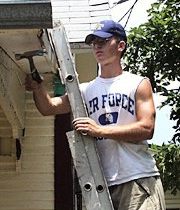Posted: 7/09/04
|
 |
| Volunteers from churches in Springtown, Keller and DeLeon join members of First Baptist Church in Comanche in painting and renovating homes for unchurched, low-income residents in their communities. It's part of Community Rehab, a ministry launched by the Comanche church. |
Community rehab volunteers seek to
show 'what the church ought to be'
By Janelle Bagci
Staff Writer
COMANCHE–Five years ago, members of First Baptist Church in Comanche launched a community project repairing homes in their town. This year, the project spread to surrounding counties, and the volunteers–mostly teenagers–reconstructed 17 homes.
First Baptist Church founded Community Rehab as an inexpensive alternative to World Changers, a North American Mission Board-sponsored program.
“The youth at First Baptist Church in Comanche spent a long time raising the money to go to World Changers, and we had a hard time seeing where it all went,” said James Stone, youth minister at First Baptist. “We decided we could do something similar right here in Comanche.”
The vision of Community Rehab is to give “tangible evidence to what the church ought to be–serving and making people better. That's what the gospel's all about,” said J.C. Baker, pastor of First Baptist Church in Weinert, who served as Community Rehab pastor during the building project.
The Comanche church put an ad in the local newspaper, asking people who need repairs on their homes to apply. Applicants had to be low-income and not affiliated with a church, because the ministry's goal is to reach unchurched people.
Community Rehab raised funds through local donations of materials and money. The project collected more than $30,000 from the city, businesses and individuals. A specialty grant from the federal government allowed a partnership with the project to reconstruct five houses. Even churches without the people to participate were able to donate funds to the cause.
More than 200 workers restored and rebuilt the 17 homes this year in DeLeon, Gustine and Comanche counties. Tasks ranged from roofing and painting to building new porches and tearing down chimneys. Participants worked five days for five hours a day.
By the end of the week, the volunteers had completed two houses more than expected.
“It meets the needs of our kids almost better than youth camp,” said Bob Whitney of First Baptist in Comanche, one of the originators of the project. It promotes team building, evangelism and service in one week, he said.
In addition to repairing homes, workers prayerwalk during their spare time and gather children for daily Bible lessons.
“We wanted to work on some houses, and maybe we'd have a presence in the neighborhood. It's gone way beyond that to Bible study and evangelism; it's getting deep,” Whitney said.
Volunteers held a worship service every night. About half of the homeowners attended the services, and several made commitments to Christ.
The project has grown each year, and churches participate from Keller, Springtown, DeLeon and Comanche.
“It's become a ripple effect,” Stone said.
“Our gifts have put us in touch with people so that when people see us, they'll give us time to tell them about Jesus,” said Charles Carroll of First Baptist in Comanche, Community Rehab construction coordinator/ supervisor.
The high school custodian's house was one of the 17 homes Community Rehab rebuilt. She has a huge impact on a lot of people because the community knows her, Stone said.
Community Rehab “is as much for us as it is for them; it got us out of our comfort zone,” Whitney said.
The homeowners especially were excited about their new homes.
“I love it. I'm so proud of it; it's beautiful,” Dixie Markham said of her new front door and window. “I feel so privileged; they worked so hard.”
Prior to Community Rehab's work, Markham's front door would not close or lock. She was forced to wire it shut.
“Now I've got a new door with a lock,” she said. “This is the first time I've ever had anything given to me. I've always had to work for everything. I just feel so privileged.”
For more information about Community Rehab, contact James Stone at (325) 356-2051.
News of religion, faith, missions, Bible study and Christian ministry among Texas Baptist churches, in the BGCT, the Southern Baptist Convention ( SBC ) and around the world.


